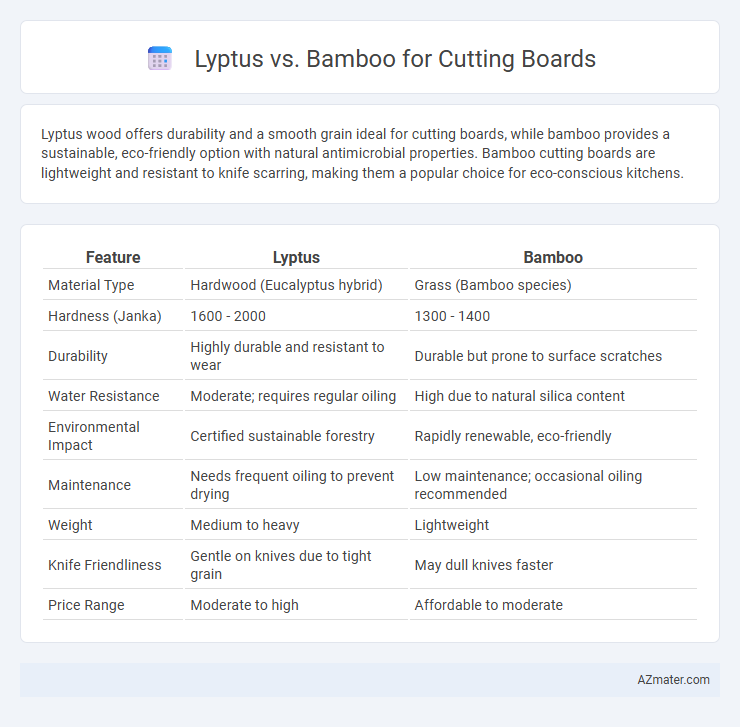Lyptus wood offers durability and a smooth grain ideal for cutting boards, while bamboo provides a sustainable, eco-friendly option with natural antimicrobial properties. Bamboo cutting boards are lightweight and resistant to knife scarring, making them a popular choice for eco-conscious kitchens.
Table of Comparison
| Feature | Lyptus | Bamboo |
|---|---|---|
| Material Type | Hardwood (Eucalyptus hybrid) | Grass (Bamboo species) |
| Hardness (Janka) | 1600 - 2000 | 1300 - 1400 |
| Durability | Highly durable and resistant to wear | Durable but prone to surface scratches |
| Water Resistance | Moderate; requires regular oiling | High due to natural silica content |
| Environmental Impact | Certified sustainable forestry | Rapidly renewable, eco-friendly |
| Maintenance | Needs frequent oiling to prevent drying | Low maintenance; occasional oiling recommended |
| Weight | Medium to heavy | Lightweight |
| Knife Friendliness | Gentle on knives due to tight grain | May dull knives faster |
| Price Range | Moderate to high | Affordable to moderate |
Introduction to Lyptus and Bamboo Cutting Boards
Lyptus cutting boards are crafted from a hybrid hardwood derived from eucalyptus trees, offering a dense, durable surface resistant to knife marks and bacteria. Bamboo cutting boards, made from fast-growing grass species, provide a sustainable and eco-friendly choice with natural antimicrobial properties and a lightweight structure. Both materials present excellent options for kitchen use, balancing durability, maintenance, and environmental impact.
Origin and Sustainability of Lyptus and Bamboo
Lyptus wood, derived from a hybrid of Eucalyptus species native to Brazil, is cultivated in sustainably managed plantations that promote rapid growth and efficient land use, minimizing environmental impact. Bamboo, originating primarily from Asia, is a fast-growing grass harvested every 3-5 years without requiring replanting, making it highly renewable and effective in carbon sequestration. Both Lyptus and bamboo demonstrate strong sustainability credentials, with Lyptus emphasizing responsible forestry practices and bamboo offering exceptional renewability and low resource consumption.
Hardness and Durability Comparison
Lyptus cutting boards offer a Janka hardness of approximately 1,200, providing solid resistance to knife marks and wear, while bamboo cutting boards typically range between 1,200 and 1,400 on the Janka scale, with strand-woven bamboo exhibiting higher hardness levels. Bamboo's natural density and fibrous structure contribute to increased durability and less splintering compared to Lyptus, which, despite being a hardwood hybrid, can show more surface wear over time. Both materials resist moisture well, but bamboo's resilience against warping and cracking under frequent use makes it a preferred choice for long-lasting cutting boards.
Maintenance and Care Requirements
Lyptus cutting boards require moderate maintenance, including regular oiling with mineral oil to prevent drying and cracking, and hand washing to preserve their wood integrity. Bamboo cutting boards are highly durable and resistant to moisture but need consistent oiling and quick drying after washing to avoid warping or mold growth. Both materials benefit from avoiding dishwashers and prolonged soaking to extend their lifespan and maintain hygiene.
Knife Friendliness: Lyptus vs Bamboo
Lyptus cutting boards are moderately knife-friendly with a dense hardwood surface that resists deep knife marks, preserving blade sharpness but offering less softness than bamboo. Bamboo boards are known for their excellent knife-friendliness due to their slightly softer, fibrous structure, which absorbs impacts and helps maintain blade edges longer. While Lyptus provides durability and knife protection, bamboo is generally preferred for optimal preservation of knife sharpness during regular use.
Aesthetics and Grain Patterns
Lyptus cutting boards showcase a rich, reddish-brown hue with a consistently fine and straight grain that enhances visual appeal and lends a sleek, modern look. Bamboo boards offer a lighter, natural golden tone with distinctive vertical and horizontal grain patterns that create a unique, textured surface ideal for rustic or eco-friendly kitchens. The uniformity of Lyptus grain provides a polished aesthetic, while bamboo's varied patterns deliver organic charm suited to diverse design preferences.
Resistance to Moisture and Bacteria
Lyptus wood offers superior resistance to moisture due to its dense, closed-grain structure, which minimizes water absorption and reduces the risk of warping or cracking in cutting boards. Bamboo, while naturally antimicrobial and resistant to bacteria, tends to absorb more moisture because of its porous nature, requiring regular maintenance to prevent bacterial growth. When prioritizing long-term durability and hygiene, Lyptus cutting boards provide a better balance of moisture resistance and bacterial defense compared to bamboo alternatives.
Environmental Impact Assessment
Lyptus cutting boards are made from fast-growing eucalyptus trees, which are harvested from sustainably managed plantations certified by the Forest Stewardship Council (FSC), reducing deforestation and promoting reforestation. Bamboo cutting boards utilize bamboo, a rapidly renewable grass that requires minimal water and pesticides, resulting in a lower carbon footprint and soil erosion impact compared to hardwood alternatives. Both materials offer environmentally friendly options, but bamboo generally has a faster growth cycle and lower resource consumption, enhancing its sustainability profile in cutting board production.
Price and Availability
Lyptus cutting boards are generally priced higher due to the wood's durability and limited supply, with availability often constrained to specialty hardwood suppliers. Bamboo cutting boards offer a more affordable and widely accessible option, commonly found in large retail stores and online marketplaces. Bamboo's rapid renewability also ensures consistent stock and competitive pricing in the cutting board market.
Choosing the Best Cutting Board: Lyptus or Bamboo
Choosing the best cutting board between Lyptus and bamboo depends on durability, sustainability, and maintenance. Lyptus, a fast-growing eucalyptus hybrid, offers a dense, hardwood surface that resists knife marks and warping better than bamboo, which is a grass with a softer texture. Bamboo boards are highly renewable and lightweight but require more frequent oiling to prevent cracking and may dull knives faster compared to the harder Lyptus wood.

Infographic: Lyptus vs Bamboo for Cutting Board
 azmater.com
azmater.com